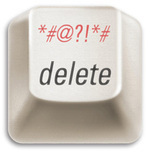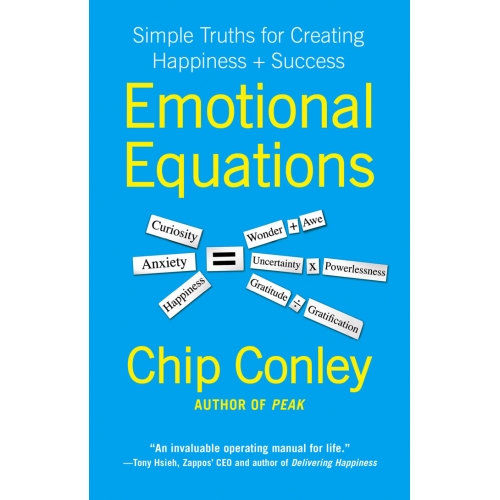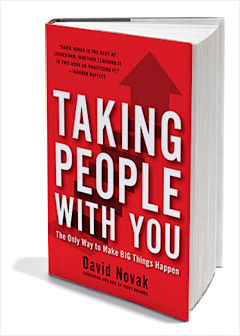Dear Work Matters readers,
As I am getting toward the end of our long effort to write "Scaling Up Excellence" with Huggy Rao, I am starting to do a bit of blogging and tweeting again. As part of it, I got an interesting email from a guy named Ben about a really awful battle over verbal abuse on something called the Linux kernel mailing list — look here, bad stuff. Ben asked me an interesting question I would like your help with: Which organizations actually have "no asshole" rules? Do they work? How do they implement them. I haven't been thinking about this much lately as I am focused on scaling. I did update the post below in early 2012, but I wonder if folks have any suggestions for places I should add — or subtract. It seems like something worth maintaining. Thanks so much!
Bob
 A reporter asked me a couple years back, “The No Asshole Rule is fun to talk about, but does anyone ever actually use it?” It turns out that there is also a lot good news out here, lots of great leaders and many civilized places that people can work.
A reporter asked me a couple years back, “The No Asshole Rule is fun to talk about, but does anyone ever actually use it?” It turns out that there is also a lot good news out here, lots of great leaders and many civilized places that people can work.
I wrote an initial list back then, and I update it every now and then. This is the latest, which I offer in celebration of Work Matters passing 2,000,000 pageviews and the impending publication of Good Boss, Bad Boss in paperback.
This list is far from exhaustive, but check out the breadth of places and the different ways that the rule is used. And if you work in a company that has the rule, that uses it well or has tried to implement it, but with limited success, I would love to hear about.
Warren Buffett's Berkshire Hathaway As Buffett's right-hand man and long-time Berkshire Hathaway Vice-Chairman Charlie Munger puts it in Snowball "We had the no asshole rule very early. Our basic rule is that we don't deal with assholes." Check out this post for more details and thoughts
SPM Communications. Principal Suzanne Miller won a national contest for women-owned business, in part because her company applies the no-jerk rule to both employees and customers. As the Dallas Morning News reported:
“It struck a chord with the judges and audience,” she said. “Everyone has worked somewhere crappy."
Ms. Miller described the contest as “American Idol for businesswomen.” About 900 applicants from around the country were whittled down to 20 finalists who assembled in Phoenix to present their cases before an audience and a panel of judges.
“Part of the competition was to give a three-minute elevator speech on how we’re different and why we’ll reach the mark,” Ms. Miller said. Like the TV talent show, the contestants ran through a rehearsal, got ripped apart by coaches and then performed for real the next day. Ms. Miller basically got her spiel down to nine words: "Life is too short to work with mean people."
2tor: This online education company is serious about the rule; the media toned things down, but the use the A-word in their materials:
The company is proud of its hard-working, but fun culture and hires based on both job qualifications and character. The company handbook says, "when you're hiring someone, don't trade off competence for character — we need people with both." The quotation comes under a heading in the handbook that could be paraphrased as "No Jerks Allowed."
Robert W. Baird. This financial services firm was first #39 on Fortune's 2008 Best Places to Work list. Now, they are up to #11. Fortune asked in 2008 "What makes it so great?" And they answered 'They tout "the no asshole rule" at this financial services firm; candidates are interviewed extensively, even by assistants who will be working for them." Since I first learned about Baird, I have spoken to multiple people from the company, including CEO Paul Purcell, who enforces the rules with zest and humor. Here are some of the details.
Barclays Capital. They don’t use the word “asshole,” because they are, after all, a respectable financial institution! BusinessWeek reports:
“Hotshots who alienate colleagues are told to change or leave. "We have a 'no jerk' rule around here," says Chief Operating Officer Rich Ricci.”
IDEO: The iconic innovation has used the rule for as long as I can remember, from its founding in 1979. And I've seem them use it in all sorts of ways during my 15 year plus involvement with the place. As their Careers FAQ page advises (and note they are kind enough to plug this blog):
Talented and diverse people: We hire talented design thinkers who represent many perspectives, disciplines, nationalities, and points of view. We believe a civilized workplace is a more rigorous and sustainable place to work, so we don’t hire jerks. (Please see The No Asshole Rule by Robert Sutton, Stanford professor and IDEO Fellow, or read his blog.) We provide ways to share knowledge and projects among our people, believing that we all work better and learn more when we freely interact and collaborate with other talented people.
The Disbarred Lawyer. The Village Voice tells us that attorney Kenny Heller might be the most obnoxious in New York City and that the powers that be finally had enough of his antics:
‘After 50 years of heaping abuse on everyone within earshot and hurling accusations of conspiracies, "favoritism," and "cronyism" at countless judges and lawyers, the 77-year-old Heller has earned this distinction: No other lawyer in the city but Heller, according to records of his disciplinary hearing, has been ousted for "obstructive and offensive behavior which did not involve fraud or deception."’
‘Heller was disbarred for basically "being an asshole," as one adversary puts it. And in their profession, the rival adds, "that takes some doing."’
Lloyd Gosselink and Perkins Coie. Lawyers may earn their bad reputations at times, but I have been pleasantly surprised by how many firms espouse and enforce “no asshole rules.” Joshua de Koning, is firm Administrator of Lloyd Gosselink Blevins Rochelle & Townsend, which is located in Austin, Texas. He wrote me a few years back:
“I ordered my copy of The No Asshole Rule a couple of weeks ago from Amazon.com and am enjoying it thoroughly. The title caught my attention, not just because it's a great title, but because our firm has had the exact same rule (phrased in exactly the same way) since it's founding in 1984.”
They are not alone. Perkins Coie, a national law firm that with headquarters in Seattle has applied the “no jerk rule” for years, which has helped the firm to be named one of “the Top 100 Best Companies to Work for” five years in a row. See this story at Human Resources Executive Online for more about how the rule works at Perkins Coie (and other nuances of the rule).
Sterling Foundation Management. Sterling helps wealthy individuals establish and management private foundations. CEO and co-founder Roger D. Sterling wrote me, after “stumbling” on The No Asshole Rule that:
‘This is a principle that I was told about early in my career as "Never do business with an Asshole," and which we have since adopted. We've applied it to both clients and employees, to greatly beneficial effect. I would reckon it of equal or greater worth than present value analysis, which I must have been taught a dozen times in the course of getting to a Ph.D. in applied economics.’
Gold’s Gym. Joe Gold was founder of the famous gym that produced multiple body building champions, including a certain future film star and California governor named Arnold. His management philosophy was:
“To keep it simple you run your gym like you run your house. Keep it clean and in good running order. No jerks allowed, members pay on time and if they give you any crap, throw them out. There's peace where there's order."
The Wine Buyer. The belief that the no asshole rule ought to be applied to customers can be seen in many industries. A California wine buyer explained how he applies the rule:
“In my business, we have a rule that says that a customer can either be an arsehole (I'm English originally) or a late pay, but not both. We have reduced stress considerably by excluding some customers on this basis.”
A related concept is “asshole taxes:” I know people in occupations ranging from plumber to management consultant who don’t “fire” asshole customers, but charge them substantially hire fees as “battle pay” for enduring the abuse.
Bible Studies Class. This one still amazes me more than any other experience that I’ve had since publishing the book. I’ve written about it before, but no list of different places where the rule has been discussed and used would be complete without it. Psychology Professor Richard Beck wrote a post called "1 Corinthians and The No Asshole Rule." He starts out:
'Two weeks ago it was my turn to teach my adult Bible class at church. We are going through 1 Corinthians and I was up to teach the famous Chapter 13, "Love is patient, love is kind…"
And I thought to myself, "Richard, what are you possibly going to say in class that hasn't been said before about 1 Corinthians 13?"
Then it hit me. I started the class by doing a book review and reading selections from Dr. Robert Sutton's new book The No Asshole Rule: Building a Civilized Workplace and Surviving One That Isn't.
Beck concludes:
'So, we reflected on all this in my Sunday School class. And after reflection on the No Asshole Rule, I read these famous words:
"Love is patient, love is kind. It does not envy, it does not boast, it is not proud. It is not rude, it is not self-seeking, it is not easily angered, it keeps no record of wrongs…"
Basically, don't be an asshole
Arup’s “No Dickhead Rule.” Arup is one of the most renowned construction engineering firms in the world; in fact, they were recently profiled in The New Yorker (Check out this abstract for the ‘The Anti-Gravity Men”). Look at this beautiful Kinas TV building the worked in Beijing. As I wrote here, Robert Care, CEO of the Arup’s Australian and Asian operations recently wrote me that they instituted the “no dickhead rule” in his part of the firm:
"I work for a truly wonderful professional services company that is truly extraordinary and that is doing really well in many many ways. Three years ago I became the CEO of our Australasian operation. It occurred to me that there was an issue (not just in the Australasian part of our operations) that needed to be dealt with. I then heard something in September 2005 that started me thinking, and then talking to my close colleagues. They encouraged me to speak more widely in my organisation and eventually we evolved a 'no dickhead policy'. "
I recently had an email from Care; He reports that he is now heading ARUP's operations in Europe and that he has introduced the "No Jerk Rule" as the word "Dickhead" didn't fit with local sensibilities, but the rule is pretty much the same.
Mozilla (which brings us the Firefox browser): Asa Dotzler a product director, leader of many efforts to spread Firefix, and a stalwart of the company and open source software movement explained to me what it isn't efficient to be an asshole at Mozilla, or in the open source world in general. As Asa explained, the work they do requires so much cooperation with each other and with people from outside the company (many of whom are volunteers, who do the coding or marketing Firefox out love for the product and what it represents about a participative and decentralized approach to the Internet), that acting like an asshole is rare because it is so downright dumb when you need so much mutual respect and trust to get the work done.
Index, a Danish Nonprofit: Their goal is to use "design to improve life." The CEO Kigge Hvid wrote me "One of our few management mottos has from the start been, KEEP OUT THE ASSHOLES. " She went on to explain:
The motto has lucky been used quite seldom. I guess that we for the last 5 years have used the motto 5-6 times – even though we work with thousands of people around the globe every year. When used we simply calls the asshole – meet with the asshole – and tell them to go play somewhere else. I my self have taken great pleasure in making these calls to a few powerful decision makers, on the basis of their brutal treatment of people working with INDEX.
Former Gillette CEO Jim Kilts advises: "Never Hire a Prick" in his book. Kilts argues that one of the practices that fueled Gillette's success during the years he led the company was "Never Hire a Prick, Even a Smart One." And, indeed, Kilts has an impressive track record, having led turnarounds at both Nabisco and Gillette. Kilts talks about how how "pricks" are smug self promoters and are destructive to the organization, and him it is essential to avoid hiring them or to drive them out of a company. As he says, they can get short-term results, but they break down people and organizations over the long haul.
Ian Telfe, CEO of Goldcorp in Canada, reported spending a lot of time enforcing the rule:
There is a bestseller right now called The No Asshole Rule. It is all about: 'Don't hire any assholes.' So I spend a lot of time picking who we're going to hire. You need someone with technical qualifications, but you also have to find someone who can work with other people and respect other people.
Garry Turdeau Womps Donald Trump with the rule in Doonesbury: You can read about it here and get to the whole cartoon.
Michael Minns Human Resources in Australia. The have a "no dickheads policy" too, which is described in quite a bit of detail on the link, along with a metric that shows it is working" "It’s the best place I’ve ever worked at, in fact it is so good that I don’t need an alarm clock to get up in the morning".
Crossfit Gym at Virgina Beach. Check of this article on the "The Asshole Barrier." This quote sums things up:
The waiver at CrossFit VB states, “CrossFit Virginia Beach strives to provide a positive and encouraging environment for our clients. Anyone that is disruptive or negatively influences this environment is subject to having their membership revoked. This is at the sole discretion of CrossFit Virginia Beach Management.” The word “asshole” isn’t used, but Gill says she frequently tells clients that “it’s basically an asshole clause.”
The diversity of this list delights me. Sure, there are still too many jerks out there and too many organizations (and apparently cities) where every day feels like a walk down Asshole Avenue. But there are also a lot of smart and civilized people who are fighting back and, better yet, winning. I’d love your comments. In particular, as I said, if you have some new examples of places that talk about and apply the rule, please tell me!
Finally, a warning, I have dealt with a number of companies over the years that espouse an no asshole rule, or want to, but are filled with assholes. In such case, it isn't a good idea to put the no asshole rule in your corporate values, handbooks, or recruiting materials because you risk being seen as both an asshole and a hypocrite.
P.S. These examples focus mostly on “top down changes,” but organizational norms can also change when persistent and influential people work to set the right example and to point out – even in public – when behavior happens that demonstrates the wrong way to behave.
A good example of this comes from a British manager who wrote me that he works in a firm that is infested with assholes, but since he read The No Asshole Rule, he and several colleagues are working to change their norms. He described one of the most effective methods as follows:
‘I now attend a lot of management meetings where I have started to introduce the idea of a civilized work place and that we lose available efficiency and effectiveness due to people being de-motivated. When I am now faced with negativity or an "Asshole" I have started to use a new approach of: “surely you don’t want us to breed that type of feeling in the business or listen to what you just said.” I have found this head on approach very successful.’


